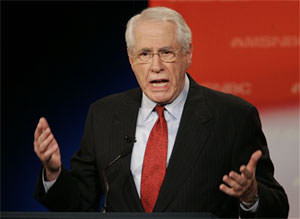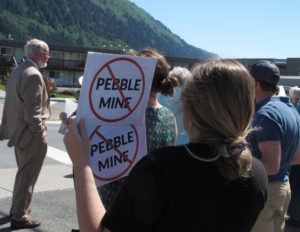Maverick Candidate Mike Gravel
Presidential candidate Mike Gravel's performance in the first Democratic debate took him from off the radar to Truthdigger of the week. Naturally, we just had to pick his brain. The former senator from Alaska, who helped end the draft, tells Truthdig why he's running, why there are so few mavericks in politics these days and why war makes him angry.
Presidential candidate Mike Gravel’s performance in the first Democratic debate took him from off the radar to Truthdigger of the week. Naturally we just had to pick his brain. The former senator from Alaska, who helped end the draft, tells Truthdig why he’s running, why there are so few mavericks in politics these days and why war makes him angry.
Click here
to listen to the interview.
Transcript:
James Harris:
This is Truthdig. James Harris, Josh Scheer. On the phone: special guest, presidential candidate for 2008, Mike Gravel. Let me start by saying a few things about this. In doing the research after that very spicy debate you were engaged in last Thursday, I found out that you published one of the exclusive issues of the Pentagon Papers. You also helped end the draft following the Vietnam War. Mr. Gravel, I want to ask you — the way you were treated by the media after that Democratic presidential debate seemed to me — they seemed to vilify you, they seemed to paint you as a lunatic, though you stand on the side of issues that a lot of Americans believed in. How do you feel about the way you were treated after that debate?
Mike Gravel: First off, having been in politics for a number of years, and being what I would call an elder statesman of some maturity, I understand some of these pundits. You can say they’ve got their own shtick. Some are pretty dumb, some lack good perception, and some are carried away with their own celebrity-ness and they don’t really understand the issues, so I accept it in that vein. Some are very good, some are really good, and so I accept it in that vein. I realize that when somebody comes out of the box that they did not anticipate, and you put out some ideas that are outside of the box, they can’t comprehend it; it’s beyond their experience to comprehend it. What happens, though, is you get the alternative, like you two fellas, that are fascinated by “Hey! We’ve never heard of this guy. What’s he about? What’s his background?”
We’re in a culture that just reveres youth, and I’m coming in as an elder statesman to be president. I’ll be the oldest one ever sworn into office. But what I bring to the table is what some pundits have a tough time understanding, and that is, I bring judgment to the table based upon a varied background of experience and accomplishment. My legislative accomplishments, what I did in four years is more than all the other candidates put together in all their career. That’s tough to understand and to piece together.
Harris: How will you win this election? What will distinguish you in the eyes of the American people?
Gravel: Telling the truth.
Harris: What’s truth right now? What’s true for America right now?
Gravel: Truth for America is that we think that we’re so much better than anyone else in the world, and we’re not. We’re no better than anybody else in the world. The truth is, we squander our wealth on the military-industrial complex for a defense that is totally inadequate. The truth is that 30 percent of our children do not graduate from high school. The truth is that one-fifth of the nation is functionally illiterate and in Washington, D.C., it’s 36 percent. I could go on. The truth is, there’s only two industrialized nations in the world that do not have healthcare for all their people. One is the United States, and the other is South Africa.
These are the things that have to be told. And so we have to tell Americans, “Look-it. Our nation is in trouble. We’re spending more than we earn. You can’t do that individually, and you can’t do that with a nation, and that means we are headed towards an economic catastrophe.” And people are whistling in the cemetery. … All the Wall Street guys are just making pigs of themselves with the amount of money they are able to rip out of the system at the expense of the average American. Average Americans know intuitively that something is very wrong, that the parties won’t solve the problem, that politicians the way they presently exist won’t solve the problem, and so with somebody coming out and saying that to the leaders who live off of their leadership position, they look at this guy and say, “My God, this guy is crazy!”
I had the same problem in the Senate. I was a maverick. And other colleagues — some loved me. Most of them didn’t understand me and were resentful of me. Why? Because you get to the U.S. Senate and you’re in the cathedral of power. And some young guy comes in and he doesn’t care about the power; he cares about trying to make a change. You don’t think that doesn’t disturb the other guys? That’s what I lived through, and that’s what I’m living through right now, and you’re a witness to it.
Josh Scheer: Now I want to ask about being a maverick. Why are there so few mavericks? Why is it that the front-runner is not a maverick? Why is it that we attack people who make bold statements and the debate . . . or tell the truth, or get angry … ?
Gravel: Because they’re basically misfits and it’s not good to have too many mavericks because they’re too disruptive. And so our congressional process is a process of making compromises. Compromising is good, but a compromise can make a situation . . . a compromise can be a bad compromise, and sometimes you shouldn’t compromise; you should stick by your guns and principles and don’t compromise. But that’s a judgment call in either case. In my particular case, what you saw in the debates — which is why I was a little shrill and angry … because I get angry over the war. I had the same problem during the Vietnam War. People were dying and they didn’t have to die, and they are dying because of the way we’re spending our tax money. You’re spending your tax money to kill people. That makes me angry. If we’re killing people for a purpose … but we’re not. This is a phony war instituted by a fraud, by a president who … thinks he’s so moral, and yet he’s immoral with … the deaths that he’s caused.
Scheer: Now I want to know: If you don’t win the primary, would you consider making another run as president through another party or would you look to maybe be a vice presidential candidate?
Gravel: That is premature. I am going to win. I am going to win for the very simple reason that people are going to be hearing from me some things they never thought they’d hear from a politician. Maybe it’s because I’m an elder statesman or an old politician that now I’ve come to a point in life where I don’t have anymore space. I was bad enough when I was a maverick in the Senate. I’ve got to tell you. What’s it going to take now as a presidential candidate is 100 times more than that. I would come back to my office, as a senator, and my staff would say, “Well, senator, God, be more like your peers. You’re too tough.” And all I could think of today, when I think back, is that I wasn’t tough enough. I wasn’t tough enough. There’s more that could be done. It’s like the war right now. I’m angry over the inability of the Democrats in the Congress to have the tactical judgment, or the strategic judgment, to really put George Bush in a box. And I’m going to be coming out, probably next week, and I’m going to call a press conference. I’ve got a plan to really get it to George Bush big-time. And if the leadership of the Congress will do as I’m suggesting, we’ll be out of Iraq in six months.
Harris: Sen. Mike Gravel, you’re telling me I’m talking to the next president of the United States …
Gravel: Yes, you are.
Harris: … so, I want to know if you would share with us what you think should be next for us in Iraq.
Gravel: What should be next is to get out, and one of the things that we should do is — . There’s a civil war going on, and so when you hear Hillary and the others say, “Well, we’re going to get out,” they’re not getting out; they’re talking about just pulling back the combat troops. That still leaves 100,000 American soldiers there and 50,000 mercenaries and then all those war profiteers that are over there ripping it off at the expense of the Iraqis. So we’re going to leave all those people there and “Sure, we’re going to end the war.” You can’t end the war. Our presence is causing the war, our very presence. So if we leave any troops there at all, the insurgents will continue the war and they’ll continue killing other people. So their plan is a non-starter.
My plan would be very simple: We pull our troops out. As we’re pulling our troops out — that takes about 60 days — we turn around and get the puppet government … and I want to say it, the word is probably … the puppet government that we’ve set up … we get them to draft 3 million young Iraqis. These young Iraqis are unemployed. Who do you think is part of the insurgency or these militias? It’s these young people that have no way of making a living and so they do this “insurgency” with banditry — the whole nine yards. What we do is draft them, put them in uniforms. OK? No civilian clothes. No arms. No arms. Begin to disarm them and turn around and give them the tools to rebuild their country with their own hands. And get the damned American war profiteers out of the country. Let them build their country, let them have some pride.
We had a program like this in the ’30s. It was called the Civilian Conservation Corps, the CCC. That’s what we need to do with Iraq and then get out, and use diplomacy, let them form their own government. It’s their country. Politicians in Washington feel we’re going to cut the country up in this way, that we’re going to get them to do this with their oil. … It’s their oil! Let them do what they want with it. Who are we to go tell them what to do? Can you imagine if we had a million and a half, a million five hundred troops in the United States — and that’s about the proportions now population-wise. If we had a million and a half troops in the United States that had the power to go anywhere with their weapons and to kick in any door and to shoot anybody when they panic, what do you think would happen in the United States of America?
Harris: Our editor, Robert Scheer, in a recent panel with Nancy Snow and a bunch of other folks, Chris Hedges … said that we are in fact afraid to let these Iraqis make their own history. Why do you think we are so fearful of leaving and allowing them to shape, as you said, their own future?
Gravel: Two reasons. One, we want to continue to control the oil and the media people on the Hill are getting briefings that we’ll lose control of this oil. That’s why we went to war. Who cares if we lose control of the oil? They’re going to sell it. They can’t drink the oil. What we should be doing is spending our treasured resources to get off of oil and to get off of that dependency. And of course, I have the proposal for a carbon tax that will begin to do it but we’ve got to first get our heads screwed on right.
It’s very simple. Energy is not an American problem. Energy, the environment, is not an American problem; it’s a global problem, and we need to work with other people from a global point of view. So I would have a carbon tax and under my administration we would set up a global institution and we’d ask other countries to come in and join us and to put carbon tax on their people and then we would take that money and integrate the global scientific community and the global engineering community into getting us off of carbon in a decade. When I say global … the Chinese are ahead of us in fusion. The French are ahead of us in fission. The Israelis are ahead of us in photovoltaic. We’re ahead, of course, in weaponry. A lot of good that’s going to do us in the long run.
Scheer: … I know you said earlier that you don’t need as many mavericks. I would hope that people are learning from you and I hope that we actually have more mavericks. I think we need more mavericks right now, more people who — .
Gravel: You’re right on that. A maverick is like putting spice on food; it gives it taste, it gives it texture. Plus, a maverick, in the areas where that person has expertise — man! — he has no problem, or she has no problem, speaking truth to power, no problem at all. That’s what my campaign is about. I’m speaking truth to the American people, who are the power in this country and I’m saying that they need to be empowered as lawmakers so that they can make policy, because the people are the power. The problem is they don’t realize and they don’t have any procedures to exercise that power other than giving their power away to politicians on Election Day. It’s all they can do, and that’s wrong.
We have, at the state and local level, people have the ability to make laws, and that’s what we have to have at the federal level. And even at the state and local level. We need to improve those laws. And so the national initiative, which is a legislative package that I’ve created, and you can go see it at my website: www.gravel08.us or www.nationalinitiative.us . It’s a federal ballot initiative to create a national initiative, which is a device to empower the people to make laws. The central power of government is lawmaking. Those who make the law determine who, how and when you vote, they determine the programs. Like our tax system: Our tax system is horrible, horrible! It’s corrupt. You see any thought to change it?
Harris: I see you are a big proponent of direct democracy and a lot of people say it’s optimistic — to say the least — to believe the people are going to come in, create their own laws, vote on those laws, and do it consistently. Do you believe the American people have the fortitude to govern themselves in the way you are asking them to?
Gravel: First off, half the people are doing that already at the state and local level. That’s already going on and has been going on for the last hundred years.
Harris: Yep.
Gravel: All I’m saying is: improve the methodology to do it and include the entire country. But we’re not doing away with Congress. We are turning around and bringing in the people into the operation of government as partners with the elected officials. The Congress will pass some federal laws, the people will pass federal laws, and so they’ll be working as partners. Now if the Congress got unreasonable — and I don’t think that will happen, politicians aren’t dumb — they’re going to turn around and they’ll accommodate the people, because the minute you bring the people in, they become the senior partners in governance.
Scheer: I’m always afraid with Congress. I don’t think they like people very much. I think they only like people when — .
Gravel: They don’t trust you. They don’t trust you. That’s the problem.
Scheer: Yeah, I don’t know about just trust, but I think they’ve — yeah. They’ve trust and fear and all sorts of scenarios until they start campaigning. That’s why I’m glad people like you are there to poke us and get us into the right direction.
Gravel: But I need people like you to help, which is what you’re doing right now. By putting me on, you are sharing what knowledge I have with your constituency, the people who listen to your program, and that’s helping. I’m not paying for this. I don’t have the resources to do this. But what you’re doing is you’re acting as a good citizen. And in the media — . The media is just as important as the government representation side of it, and when they do a bad job, as they do — mainline media does a bad job, has been, they lay down flat. And what is absolutely the miracle that’s happening that’s going to save our democracy, is the product of the technology of the Internet and what’s going on with the blogs. People like yourself who are just going to do their number and do it in conscious, and do it to the best of your ability. You’re going to make mistakes. You’re going to misinterpret things. I do this. It’s no big deal.
You’ll find as you get older you do a little better job, you understand things a little better. And that’s the reason why I think I’ll be a great president. The reason, very simple, is that I will bring judgment to the table, to the Oval Office, and I will take this country and turn it 180 degrees into the opposite direction that it has been going, and I’ll do it with a fair tax, we’ll change our economic society from a consumption society to a saving society. I’ll do it with a new moral tone of integrity. And I’m not going to serve for more than four years. I’m not going to go around with a tin cup raising money for my second term. Heck no! I’m just going to get it done in four years. When I was a senator, everything I accomplished I got done in the first four years. After that it was just getting overwhelmed by the system.
We’ll have term limits. I believe in term limits. I think the president should only be six years. None of this reelection stuff. And in the Senate, 12 years. And in the House, four-year terms, three terms and you’re out. And then with the judiciary, 12 years and you’re out. Up or out. That means 12 years for the Supreme Court of the United States. When you appoint people to a powerful position for life, understand: Power is a corrupting agent. It corrupts everybody to some degree. It’s a corrupting agent. And the worst kind of power is the corruption it does intellectually to people. And so you put nine people on the Supreme Court and they live there for life … you don’t think that they’re not intellectually corrupted? These are human beings.
Scheer: When the debate happened, everyone else was sitting there, and I was with three friends. We were all kind of going, “Oh, it’s the same old thing,” and then you came on and woke ’em up, and two people who weren’t even going to vote now have decided to vote for you. And the minute I saw you I said we have to get this guy on Truthdig, so I’m glad you came here today.
Gravel: Thank you for having me, very, very much. We’re all pulling on the same thing. We want a better life for everybody and we have the capacity to do that. Putting the tool in the hands of the people to make laws will bring about explosive creativity and advancement. Here. It’s not trite. The people can make better decisions than leaders because they don’t have the same barriers. The people, the constituency. Now, you’ve got to understand this. A person could say, “Yes, empower the people. … I know that guy down the street and he’s a jerk. I wouldn’t want to see him make laws.” But that’s not the way it works. It’s the constituency of the whole.
Right now our national constituency is around 130 million Americans registered to vote, and so decisions will be made by the majority of that. You won’t have a turnout of that all the time, but just stop and think. If you had 50 million people voting on issues, on policy issues — they’re not going to get involved with the day-to-day operation; it’s the policy issues. And so what happens. … Where are you going to get the best decision? The majority of 50 million people or the majority of 535 people and nine people in black robes? You’re going to get the best decisions from the people every time. If the people had the law, the national initiative, the federal ballot initiative that I’m putting forth, which goes around the Congress, the people have to vote for this directly. If the people had that, we’d get out of Iraq in the next 60 days. Because the people — you can tell by the polls — they want out. What’s wrong with the leadership that can’t comply with the will of the majority?
Harris: Well, you heard it here. Sen. Mike Gravel for President 2008. Be sure to visit the website: http://www.gravel2008.us/. For Josh Scheer and for Mike Gravel, this is James Harris, and this is Truthdig.
Your support matters…Independent journalism is under threat and overshadowed by heavily funded mainstream media.
You can help level the playing field. Become a member.
Your tax-deductible contribution keeps us digging beneath the headlines to give you thought-provoking, investigative reporting and analysis that unearths what's really happening- without compromise.
Give today to support our courageous, independent journalists.






You need to be a supporter to comment.
There are currently no responses to this article.
Be the first to respond.